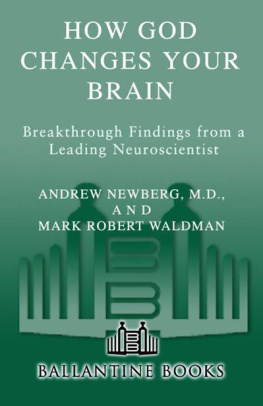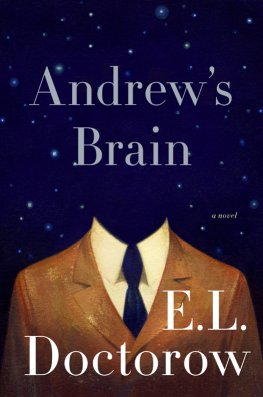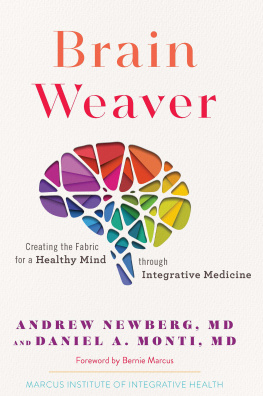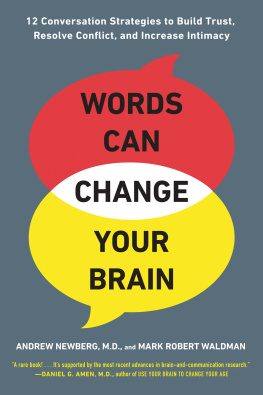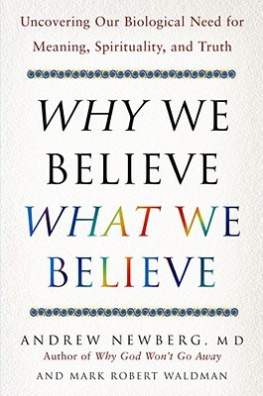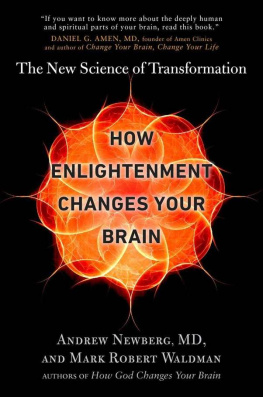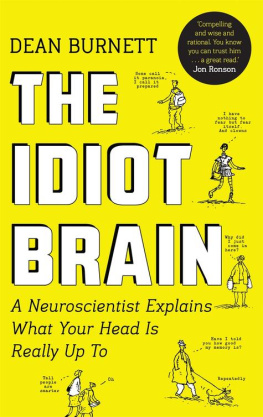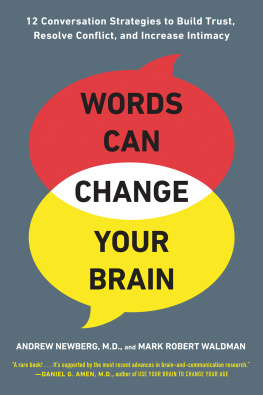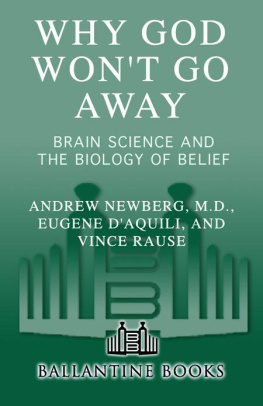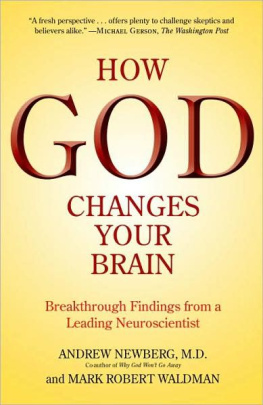ALSO BY ANDREW NEWBERG, M.D.,
AND MARK ROBERT WALDMAN
Born To Believe:
God, Science, and the Origin of Ordinary and Extraordinary Beliefs
Why We Believe What We Believe:
Uncovering Our Biological Need for Meaning, Spirituality, and Truth
ALSO BY ANDREW NEWBERG, M.D.
Why God Won't Go Away
(WITH EUGENE D'AQUILI AND VINCE RAUSE)
The Mystical Mind
(WITH EUGENE D'AQUILI)
ALSO BY MARK ROBERT WALDMAN
Archetypes of the Collective Unconscious, Vols 14
(Shadow, Seeker, Lover, Healer)
The Spirit of Writing
Love Games
Dreamscaping
(WITH STANLEY KRIPPNER)
The Art of Staying Together
TO OUR STUDENTS, PATIENTS, AND
RESEARCH PARTICIPANTS:
You have helped to redefine the religious landscape of
contemporary American society by demonstrating the beauty,
diversity, optimism, and health benefits associated with
the spiritual practices of the world.
CONTENTS
| ONE. |
| 1. | Who Cares about God?
Prelude to a Neurological and Spiritual Revolution |
| 2. | Do You Even Need God When You Pray?
Meditation, Memory, and the Aging Brain |
| 3. | What Does God Do to Your Brain?
The Neural Varieties of Spiritual Practice |
| TWO. |
| 4. | What Does God Feel Like?
The Varieties of Spiritual Experience |
| 5. | What Does God Look Like?
Imagination, Creativity, and the Visual Representation of Spirituality |
| 6. | Does God Have a Heart?
Compassion, Mysticism, and the Spiritual Personalities of the Brain |
| 7. | What Happens When God Gets Mad?
Anger, Fear, and the Fundamentalist in Our Brain |
| THREE. |
| 8. | Exercising Your Brain
Eight Ways to Enhance Your Physical, Mental, and Spiritual Health |
| 9. | Finding Serenity
Meditation, Intention, Relaxation, and Awareness |
| 10. | Compassionate Communication
Dialogue, Intimacy, and Conflict Transformation |
EPILOGUE: Is God Real?
A Personal Reflection
APPENDIX A. Compassionate Communication
CDs, Workshops, and Online Research
APPENDIX B.
APPENDIX C. Meditation and Mindfulness
Books, CDs, and Resources
AUTHOR'S NOTE
Throughout most of this book Mark and I will be speaking to you with a united voice, for we have closely collaborated on the research we present. Thus, we liberally substitute I and we, and only occasionally specify ourselves as individuals, since the anecdotes we relate tend to reflect our shared experiences and values. However, when I is used to talk about the brain-scan research conducted at the University of Pennsylvania, it is in reference to myself, as are most of the anecdotes that refer to childhood and college experiences. But research is never a solitary venture, so you'll often find references to our work, which includes not just Mark, but also the members of my research staff at the university, without whom I could not possibly conduct the work I do. For a list of those who have contributed to the research gathered in this volume, please see the acknowledgment page at the end of this book.
Of all the fields of science and medicine, neurophysiology is one of the most difficult topics to talk about in simple terms, especially when it comes to issues concerning consciousness, logic, emotional processing, and the reality-processing mechanisms of the brainissues that are essential to address when dealing with the neurological correlates of spiritual experiences and religious beliefs. We have made the information as user friendly as possible, but generalizations often leave out important qualifications and concerns. Therefore, for those who desire additional information, we have provided extensive peer-reviewed referencesover a thousandin the endnotes to substantiate the conclusions we have drawn.
RELIGION
AND THE
HUMAN BRAIN
Our time is distinguished by wonderful achievements in the fields of scientific understanding and the technical application of those insights. Who would not be cheered by this? But let us not forget that knowledge and skills alone cannot lead humanity to a happy and dignified life. Humanity has every reason to place the proclaimers of high moral standards and values above the discoverers of objective truth. What humanity owes to personalities like Buddha, Moses, and Jesus ranks for me higher than all the achievements of the inquiring and constructive mind.
ALBERT EINSTEIN, THE HUMAN SIDE
1
WHO CARES ABOUT GOD?
Prelude to a Neurological and
Spiritual Revolution
God.
In America, I cannot think of any other word that stirs up the imagination more. Even young children raised in nonreligious communities understand the concept of God, and when asked, will willingly draw you a pictureusually the proverbial old man with the long hair and a beard. As children grow into adults, their pictures of God often evolve into abstract images of clouds, spirals, sunbursts, and even mirrors, as they attempt to integrate the properties of a reality they cannot see. In fact, the more a person thinks about God, the more complex and imaginative the concept becomes, taking on unique nuances of meaning that differ from one individual to the next.
If you contemplate God long enough, something surprising happens in the brain. Neural functioning begins to change. Different circuits become activated, while others become deactivated. New dendrites are formed, new synaptic connections are made, and the brain becomes more sensitive to subtle realms of experience. Perceptions alter, beliefs begin to change, and if God has meaning for you, then God becomes neurologically real. For some, God may remain a primitive concept, limited to the way a young child interprets the world. But for most people, God is transformed into a symbol or metaphor representing a wide range of personal, ethical, social, and universal values. And, if you happen to be a neuroscientist, God can be one of the most fascinating of human experiences to explore.
THE SCIENCE OF GOD
For the past fifteen years I have investigated the neural mechanisms of spirituality with the same fervor that a minister contemplates God. Some religious rituals do nothing more than relax you, others help to keep you focused and alert, but a few appear to take practitioners into transcendent realms of mystical experience where their entire lives are changed.
Our research team at the University of Pennsylvania has consistently demonstrated that God is part of our consciousness and that the more you think about God, the more you will alter the neural circuitry in specific parts of your brain. That is why I say, with the utmost confidence, that God can change your brain. And it doesn't matter if you're a Christian or a Jew, a Muslim or a Hindu, or an agnostic or an atheist.

